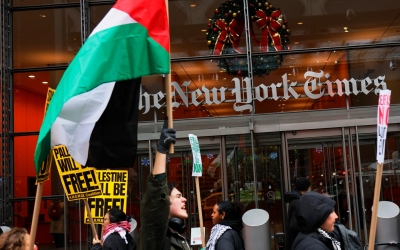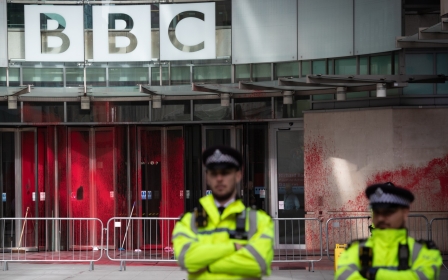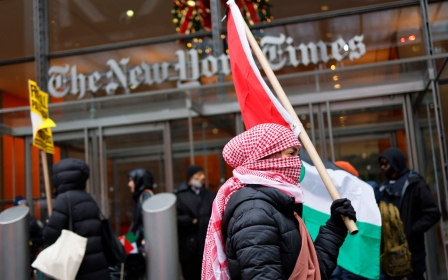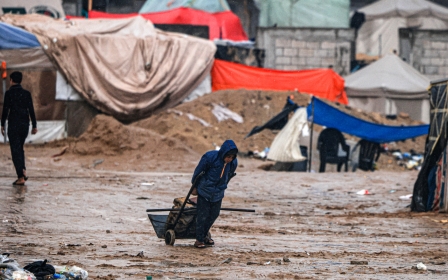'Civil War': A brutal indictment of western journalism's disregard for the truth
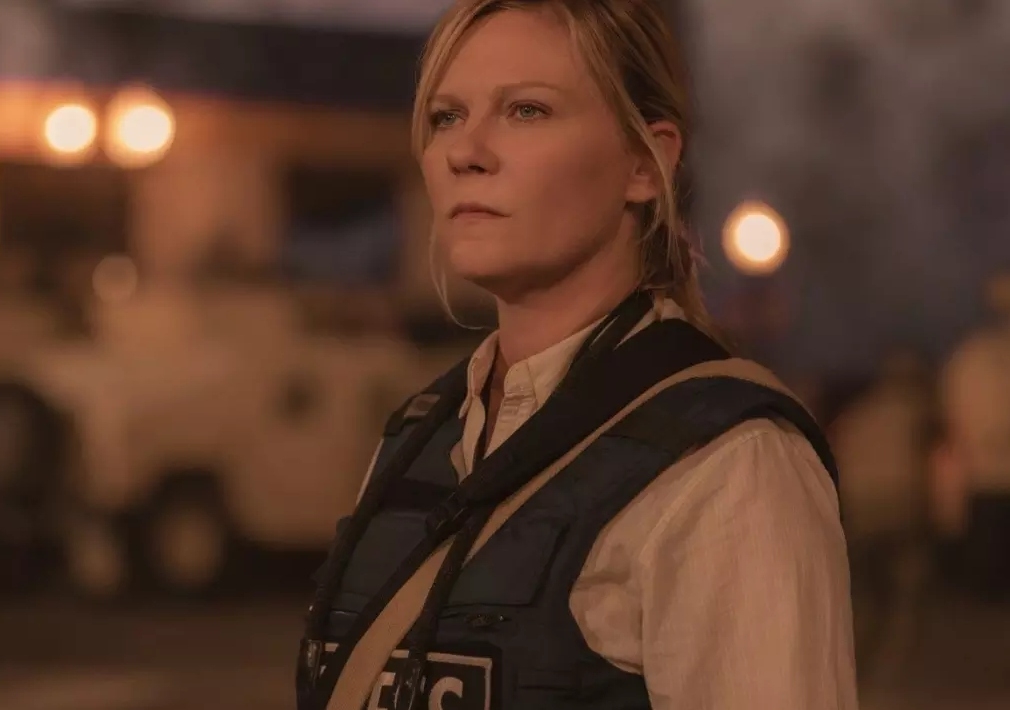
Warning: This article contains spoilers about the film Civil War
In a recent Daily Show interview, Christiane Amanpour diagnosed the problem with covering Gaza.
“Journalists are not on the ground,” she said
Jon Stewart corrects her. Her claim is patently false and ignores the unprecedented rate with which Israel has killed journalists in Gaza - Reporters Without Borders’ estimate is 103 in five months.
Despite apologising, Amanpour doubles down, condescendingly distinguishing between Palestinian and western journalists. While the former tells “stories about a people”, the latter is independent and objective: “We go there to be the eyes and ears of everybody who can’t go.”
New MEE newsletter: Jerusalem Dispatch
Sign up to get the latest insights and analysis on Israel-Palestine, alongside Turkey Unpacked and other MEE newsletters
Amanpour’s remarks are obviously racist and absurd - how are Gaza’s journalists not “the eyes and ears” of the world? - but also confessional.
Palestinian journalists “telling the story of Gaza” are contrasted to “dehumanising numbers”; an admission of how Amanpour views her own work.
Given the egregious disinformation western media has spread during the ongoing Gaza genocide, refuting the western journalist’s mythical objectivity is no longer sufficient - hegemonic outlets such as the New York Times and the Washington Post routinely make such paltry concessions.
It is much more pertinent to ask: what is the function of western journalism? Beyond "biased" or "inaccurate", what media does it actually produce?
Aestheticising violence
These questions fuel the harrowing road trip of Alex Garland’s film Civil War; a brutal indictment of Americans’ limitless capacity to aestheticise violence.
The story follows a group of journalists travelling from New York to DC. There is veteran war photographer Lee (Kirsten Dunst), her working partner Joel (Wagner Moura), their mentor Sammy (Stephen McKinley Henderson), and the amateur Jessie (Cailee Spaeny), who idolises Lee.
Follow Middle East Eye's live coverage for all the latest on the Israel-Palestine war
Everyone agrees: the capital will be taken on the fourth of July by the Western Forces, an alliance between Texas and California. The journalists rush south to interview the president (Nick Offerman) before the assault. Everything they see and document on the way is horrible, but their photographs are not.
The pictures they make of the war are both stunning and meaningless; spectacular snapshots of stories they refuse to tell.
We see intense contextless gunfights, anonymous atrocities, and un-historicised developments in the war’s trajectory: a perfect encapsulation of how the US covers global conflicts
Civil War is not interested in its fictional factions but in how American media would distort and obfuscate whatever it is they are.
Unsurprisingly, and in large part due to Garland's own attempts to promote it as such, the film has been misinterpreted by both defenders and detractors as “apolitical”. There is, however, a straightforward reason for the hazy depiction of the war: the protagonists do not care.
Their perspective defines how we understand the war - and so we are left none the wiser. We see intense contextless gunfights, anonymous atrocities, and un-historicised developments in the war’s trajectory: a perfect encapsulation of how the US covers global conflicts.
The horrors depicted throughout Civil War resemble the average sloppy war film about tragic, ambiguous conflicts in the developing world - think Blood Diamond (2006) or Beasts of No Nation (2015).
This aesthetic choice articulates the connection between the mediatisation and (mis)representation of violence.
Naive and ignorant
Lee’s legacy is defined by such images. Jessie instantly recognises her when they meet and later gushes over her iconic photos, including a snapshot of something called the “Antifa massacre”.
The glee with which Jessie discusses Lee’s coverage of war crimes is disturbing, but not as much as both journalists’ total disinterest in the events depicted in the photos, to say nothing of the photos’ impact, if any.
In a sombre conversation with Sammy, Lee finally says something resembling a political statement. Reflecting on the grotesque imagery she witnessed and documented abroad, she laments: “I thought I was sending a message home: don’t do this. And yet here we are.”
As much as her jaded manners imply a weary wisdom, Lee proves to be just as naive and ignorant as Jessie. She completely fails to realise that, with regards to any 21st-century war, the US probably did do it. Domestic collapse directly continues what she witnessed abroad. Ironically, the photographer cannot see this.
In American narrative media, ambiguous conflict often creates equivalences between asymmetrical sides and demonises actual resistance to oppression - the videogame The Last of Us exemplifies such sly trickery.
But in Civil War, the fighting’s political illegibility deconstructs American journalism itself. The film is “devoid” of politics because politics are irrelevant to the protagonists. Profit is not. They do not even pretend to seek “truth”.
They risk their lives for the “money shot”; they are motivated to interview the doomed president, not because they believe he has anything insightful to say, but because they seek another iconic entry for their portfolio, another reason for them to be remembered. Iconicity for its own sake.
When Jessie and Lee look over photos of a shootout between unidentified militiamen (Hawaiian shirts suggest the Boogaloo Boys) and federal soldiers, Lee picks one of a fighter yelling as he tries to resuscitate a wounded comrade, earnestly remarking: “That’s a great photo, Jessie.”
And she is right. It is terrifically composed and searingly dramatic; every face and action is clear. It also says nothing about the encounter. If the tired cliche goes “a picture is worth a thousand words”, Civil War’s response is a resounding, "no, but it could be worth more than a thousand dollars".
Joel is also crucial to the film’s scathing portrait of American journalism. Wagner Moura’s unhinged performance reveals a psychotic attraction to violence.
A night sky lit by artillery makes him horny, which he flirtatiously shares with the much younger Jessie. His chain-smoking and wry commentary conceal exceptional naivety. Facing a white supremacist militiaman (Jesse Plemons), he foolishly pleads for safe passage, crying, “we are Americans!”, and is flabbergasted when the man dryly retorts: “OK… what kind of American are you?”
To think a fascist with literal blood on one hand and an assault rifle in the other would care about, in US racialist terms, a visibly Latino man’s “Americanness” is astonishingly delusional, echoing a recent incident in the occupied West Bank in which Israeli photographer Shaul Golan thought screaming “I’m not an Arab, I’m a Jew!” would save him from settler violence.
Dehumanising function
The Civil War journalists’ obsession with violence ultimately alienates them from each other. When Jessie asks Lee if she would photograph her if she got shot, Lee prophetically responds: "Yes."
Later, the group arrives in DC too late. The Western Forces are charging in, and interviewing the doomed president is no longer possible. But photographing his corpse still is, so they follow the rebellious soldiers through the war zone towards the White House.
In shamelessly aestheticising violence, the protagonists of 'Civil War' demonstrate the dehumanising function of western journalism that Amanpour accidentally admitted to Stewart
In a corridor outside the Oval Office, Lee is shot while pushing Jessie to the ground to protect her from crossfire. Robotically, Jessie photographs Lee falling and dying.
There is no mourning for her idol and surrogate mother, only the money shot waiting down the hall, the single frame that will make her more famous than Lee. Jessie gets her shot, pun intended.
As the credits roll, we see the photo: soldiers smiling by the bullet-torn president. Lee, like the civil war’s details, does not matter.
In shamelessly aestheticising violence, Civil War’s protagonists demonstrate the dehumanising function of western journalism that Amanpour accidentally admitted to Stewart.
Her disdain towards Palestinian journalists not only insults the immense sacrifices of people such as Shireen Abu Akleh and Wael Dahdouh, but also perpetuates the fantasy of the noble western journalist.
Civil War is exceptional because that fantasy is its subject, not the eponymous fictional conflict.
Its anti-heroes are journalists according to the strictest professional definition of the word. But they are not interested in anyone’s eyes and ears - only in the money shot.
The views expressed in this article belong to the author and do not necessarily reflect the editorial policy of Middle East Eye.
Middle East Eye delivers independent and unrivalled coverage and analysis of the Middle East, North Africa and beyond. To learn more about republishing this content and the associated fees, please fill out this form. More about MEE can be found here.



